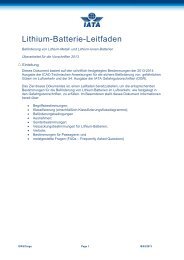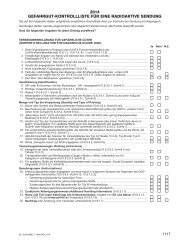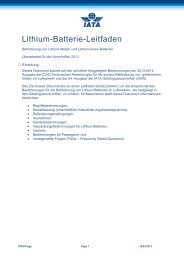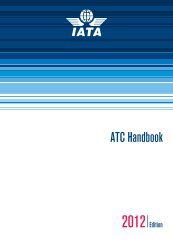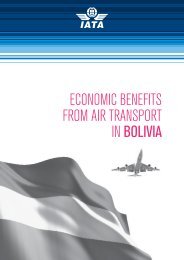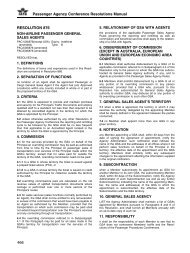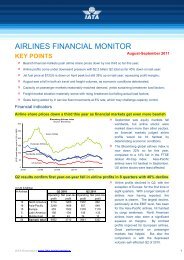Create successful ePaper yourself
Turn your PDF publications into a flip-book with our unique Google optimized e-Paper software.
FEATURE<br />
Can aviation biofuels work?<br />
Biofuels are integral to the<br />
sustainable growth of aviation.<br />
But the fledgling industry<br />
needs government policies that<br />
promote capital investment in<br />
biofuels. This would help to<br />
ensure that biofuels are available<br />
at a competitive price and<br />
in the required quantity.<br />
Reducing the risk from investing<br />
in biofuels is essential.<br />
Although there is already good<br />
evidence that biofuels are dropping<br />
in price even as conventional<br />
jet fuel becomes more<br />
expensive, the trend toward<br />
less-costly biofuels needs to<br />
be accelerated. Governments<br />
can furnish a welcome boost<br />
by providing a level playing field<br />
for biofuels with the heavily<br />
subsidized biodiesel sector and<br />
by prioritizing aviation in energy<br />
policy. Other forms of transport<br />
have alternative forms of energy<br />
available. Automotive vehicles,<br />
for example, can benefit from<br />
advances in electric power.<br />
The fossil fuel<br />
emission path<br />
0%<br />
efficient<br />
cycle<br />
Governments also need to<br />
ensure that loans and tax<br />
incentives are available to<br />
help support the research and<br />
development of biofuels and<br />
to ensure that biofuel production<br />
infrastructure gets built.<br />
Funding academic research<br />
into the choice and properties<br />
of biomass would go a long<br />
way to deciding which biomasses<br />
to pursue. A number<br />
of good biomass options exist,<br />
from urban waste to algae, with<br />
some more suited to certain<br />
climates and geographical locations<br />
than others. Ultimately,<br />
it is expected that aviation will<br />
utilize biofuels derived from a<br />
range of feedstocks.<br />
The harmonization and mutual<br />
recognition of biofuels standards<br />
is another area in need<br />
of government input. What is<br />
recognized by one country as<br />
a sustainable biofuel should<br />
count the same way in other<br />
locations. The Roundtable for<br />
Sustainable Biofuels has<br />
already issued guidelines for<br />
sustainability criteria.<br />
Hypothetical biofuel<br />
emission cycle<br />
Seedstock100%<br />
efficient<br />
cycle<br />
34<br />
Nevertheless, a plethora of<br />
regulations remains worldwide.<br />
Agreed-upon sustainability<br />
criteria would improve coordination<br />
between regulatory standards<br />
and move governments<br />
toward mutual recognition. It<br />
would also lower investment<br />
risks thanks to increased transparency.<br />
Aviation’s global nature,<br />
including common global<br />
equipment and worldwide fuel<br />
purchasing and sustainability<br />
requirements, makes global<br />
standards essential to progress<br />
on biofuels.<br />
Advancing biofuels usage is<br />
not just about government<br />
cooperation. Equally important<br />
for the progress of the biofuels<br />
industry will be a collaborative<br />
supply chain. Understanding<br />
how to tackle production costs<br />
is the type of challenge that<br />
brings together many parties<br />
that traditionally haven’t<br />
worked together. These include<br />
airlines, academics, farmers<br />
and agricultural associations, oil<br />
refineries, regulators, and environmental<br />
groups. Government<br />
departments for transport,<br />
enterprise, agriculture, and the<br />
environment will also need to<br />
get involved.<br />
The rewards are there for aviation,<br />
for government, and for<br />
all other stakeholders. Biofuels<br />
could well become a vibrant<br />
new industry, providing jobs, inspiring<br />
innovation, and assuring<br />
an important new fuel source.<br />
Around 80% of civil aviation<br />
is concentrated at just 190<br />
airports worldwide. Any positive<br />
action on aviation biofuels<br />
would offer the opportunity to<br />
significantly decarbonize an<br />
entire industry sector.<br />
Governments must give the<br />
industry the encouragement it<br />
needs through a set of legal,<br />
fiscal, and policy responses that<br />
ensure this exciting new energy<br />
stream becomes commercialized<br />
as quickly as possible.<br />
Actual biofuel<br />
emission cycle<br />
Seedstock 80%<br />
efficient<br />
cycle



